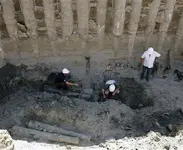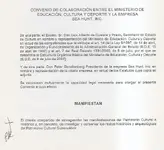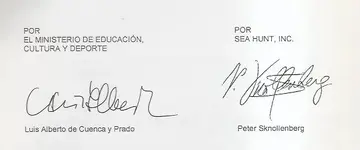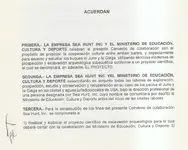piratediver
Sr. Member
- Joined
- Jun 29, 2006
- Messages
- 264
- Reaction score
- 6
- Golden Thread
- 0
- Location
- newport, Rhode Island
- Primary Interest:
- All Treasure Hunting
- #1
Thread Owner
Have a look at what the mayor of Buenos Aires says about ownership of the galleon!
Pirate diver
Builders dig up 17th-century galleon in Argentina
Mayor of Buenos Aires prays for gold as archaeologists raise Spanish vessel
found while building apartment block
Archaeologist Marcelo Norman Waissell holds a cannonball near two cannon of
a Spanish galleon found while excavating a Buenos Aires building site.
Photograph: Marcos Brindicci/REUTERS
Construction workers excavating the foundations of a luxury apartment block
overlooking the river Plate in Buenos Aires may have dug up something far
more valuable than what they are building.
The workmen uncovered the well-preserved remains of a 17th-century Spanish
galleon, one of thousands that carried goods across the Atlantic when
Argentina was a Spanish colony.
Eight metres of silt had covered and conserved the galleon in the 300 years
since it sank or was abandoned by colonists.
At that time the exclusive Puerto Madero neighbourhood of the Argentinian
capital was just a beach on the shores of the Plate. "The galleon was buried
under Puerto Madero, in the sedimentation of a beach where many ships used
to arrive centuries ago," explained city hall officials.
Five large cannons and a cannonball were among the first objects found by
archaeologists who joined the workmen to excavate the site properly.
Speculation that the galleon may be carrying treasure is rife in Buenos
Aires, with even the mayor, Mauricio Macri, praying for a find. "I hope
there is a great treasure trove on board," he joked. "That way we can pay
for many more public works."
So far, however, the only objects dug up apart from the cannons are ropes
and old jars of olive oil. The galleon appears to have sunk as it was trying
to reach the port at Buenos Aires.
"We feel it must be Spanish because we have not found signs of anything
English," one archaeologist, Marcelo Weissel, told La Nación newspaper. "Our
hypothesis is that it is from the end of the 17th or the beginning of the
18th century because we have not found any glass recipients which started
appearing from Holland around 1720." Carbon dating would eventually give a
better idea of when the vessel went down, he said.
Mayor Macri ruled out handing over the galleon's contents to Spain, saying
that it belonged to the people of Buenos Aires.
Hernan Lombardi, the head of the city's culture department, said the find
was unique and city archeologists planned to raise the whole ship, which
would later be opened to the public.
"Now is the time to get down to some careful work," he said.
Development in the Puerto Moreno district began a decade ago. A complex of
apartments, shop and offices is due to go up on the site where the galleon
was found.
guardian.co.uk © Guardian News and Media Limited 2008
Pirate diver
Builders dig up 17th-century galleon in Argentina
Mayor of Buenos Aires prays for gold as archaeologists raise Spanish vessel
found while building apartment block
Archaeologist Marcelo Norman Waissell holds a cannonball near two cannon of
a Spanish galleon found while excavating a Buenos Aires building site.
Photograph: Marcos Brindicci/REUTERS
Construction workers excavating the foundations of a luxury apartment block
overlooking the river Plate in Buenos Aires may have dug up something far
more valuable than what they are building.
The workmen uncovered the well-preserved remains of a 17th-century Spanish
galleon, one of thousands that carried goods across the Atlantic when
Argentina was a Spanish colony.
Eight metres of silt had covered and conserved the galleon in the 300 years
since it sank or was abandoned by colonists.
At that time the exclusive Puerto Madero neighbourhood of the Argentinian
capital was just a beach on the shores of the Plate. "The galleon was buried
under Puerto Madero, in the sedimentation of a beach where many ships used
to arrive centuries ago," explained city hall officials.
Five large cannons and a cannonball were among the first objects found by
archaeologists who joined the workmen to excavate the site properly.
Speculation that the galleon may be carrying treasure is rife in Buenos
Aires, with even the mayor, Mauricio Macri, praying for a find. "I hope
there is a great treasure trove on board," he joked. "That way we can pay
for many more public works."
So far, however, the only objects dug up apart from the cannons are ropes
and old jars of olive oil. The galleon appears to have sunk as it was trying
to reach the port at Buenos Aires.
"We feel it must be Spanish because we have not found signs of anything
English," one archaeologist, Marcelo Weissel, told La Nación newspaper. "Our
hypothesis is that it is from the end of the 17th or the beginning of the
18th century because we have not found any glass recipients which started
appearing from Holland around 1720." Carbon dating would eventually give a
better idea of when the vessel went down, he said.
Mayor Macri ruled out handing over the galleon's contents to Spain, saying
that it belonged to the people of Buenos Aires.
Hernan Lombardi, the head of the city's culture department, said the find
was unique and city archeologists planned to raise the whole ship, which
would later be opened to the public.
"Now is the time to get down to some careful work," he said.
Development in the Puerto Moreno district began a decade ago. A complex of
apartments, shop and offices is due to go up on the site where the galleon
was found.
guardian.co.uk © Guardian News and Media Limited 2008








 Lynn
Lynn
